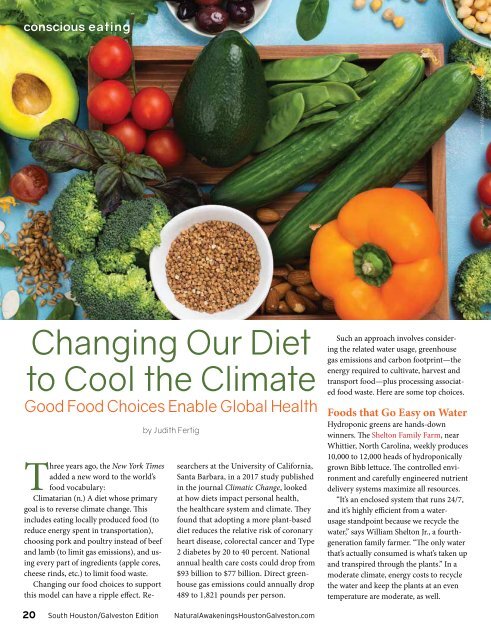Natural Awakenings S Houston Galveston April 2018
Annual Healthy Living Directory & Earth Day Issue
Annual Healthy Living Directory & Earth Day Issue
Create successful ePaper yourself
Turn your PDF publications into a flip-book with our unique Google optimized e-Paper software.
conscious eating<br />
Ekaterina Markelova/Shutterstock.com<br />
Changing Our Diet<br />
to Cool the Climate<br />
Good Food Choices Enable Global Health<br />
by Judith Fertig<br />
Three years ago, the New York Times<br />
added a new word to the world’s<br />
food vocabulary:<br />
Climatarian (n.) A diet whose primary<br />
goal is to reverse climate change. This<br />
includes eating locally produced food (to<br />
reduce energy spent in transportation),<br />
choosing pork and poultry instead of beef<br />
and lamb (to limit gas emissions), and using<br />
every part of ingredients (apple cores,<br />
cheese rinds, etc.) to limit food waste.<br />
Changing our food choices to support<br />
this model can have a ripple effect. Researchers<br />
at the University of California,<br />
Santa Barbara, in a 2017 study published<br />
in the journal Climatic Change, looked<br />
at how diets impact personal health,<br />
the healthcare system and climate. They<br />
found that adopting a more plant-based<br />
diet reduces the relative risk of coronary<br />
heart disease, colorectal cancer and Type<br />
2 diabetes by 20 to 40 percent. National<br />
annual health care costs could drop from<br />
$93 billion to $77 billion. Direct greenhouse<br />
gas emissions could annually drop<br />
489 to 1,821 pounds per person.<br />
Such an approach involves considering<br />
the related water usage, greenhouse<br />
gas emissions and carbon footprint—the<br />
energy required to cultivate, harvest and<br />
transport food—plus processing associated<br />
food waste. Here are some top choices.<br />
Foods that Go Easy on Water<br />
Hydroponic greens are hands-down<br />
winners. The Shelton Family Farm, near<br />
Whittier, North Carolina, weekly produces<br />
10,000 to 12,000 heads of hydroponically<br />
grown Bibb lettuce. The controlled environment<br />
and carefully engineered nutrient<br />
delivery systems maximize all resources.<br />
“It’s an enclosed system that runs 24/7,<br />
and it’s highly efficient from a waterusage<br />
standpoint because we recycle the<br />
water,” says William Shelton Jr., a fourthgeneration<br />
family farmer. “The only water<br />
that’s actually consumed is what’s taken up<br />
and transpired through the plants.” In a<br />
moderate climate, energy costs to recycle<br />
the water and keep the plants at an even<br />
temperature are moderate, as well.<br />
20 South <strong>Houston</strong>/<strong>Galveston</strong> Edition <strong>Natural</strong><strong>Awakenings</strong><strong>Houston</strong><strong>Galveston</strong>.com


